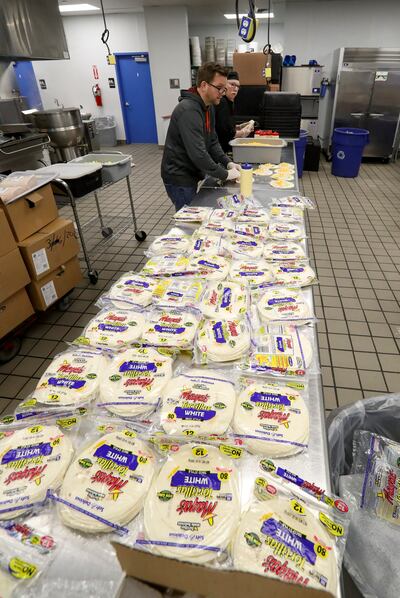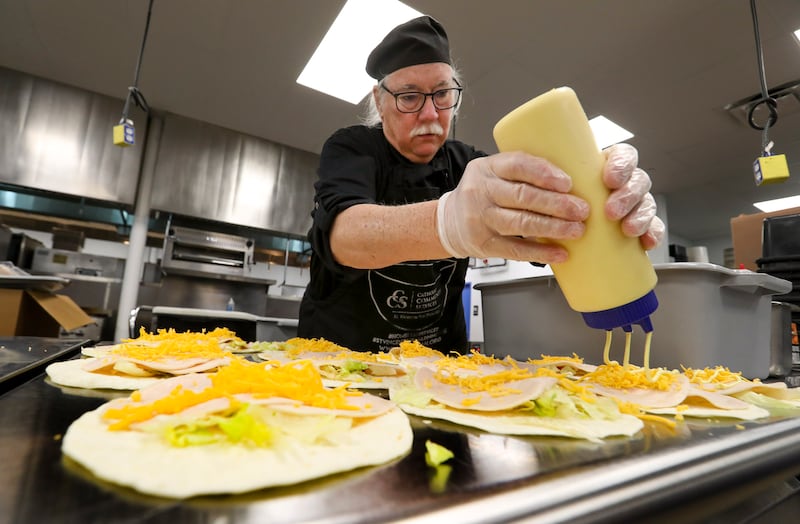SALT LAKE CITY — The COVID-19 crisis is increasing demand for community services, while simultaneously making it harder to provide them to people in need.
Food pantries, homeless shelters and other nonprofits can’t function like they normally do in a socially distanced world. They’ve been forced to quickly adjust their programs to keep clients and workers safe and meet growing needs.
“The smell of bleach is the most prevalent scent in the air,” said Cindy Mecklenburg, public relations and human resources director for Catholic Community Services of Utah.
Humanitarian organizations, like many of us, hadn’t prepared to face a coronavirus pandemic. But now that it’s here, they’re trying to stay focused on what matters most.
“This is my most important mission right now: to continue the flow of food,” said Jane Merrow, who directs a food pantry run by First Parish Church of Newbury, Massachusetts.
Government officials share that goal, and, at the state and local level, they’re working with community nonprofits to keep their doors open.
“We’re certainly getting support from local and state leaders,” Mecklenburg said.
It’s federal lawmakers who could be doing more to support social service organizations in this time of need, according to policy experts.
We’ve barely heard from Congress about what’s happening to them, said Stanley Carlson-Thies, founder and senior director of the Institutional Religious Freedom Alliance, which is based in Washington, D.C.

Nonprofits and the stimulus package
Congress’ $2 trillion stimulus package, which was still being finalized Wednesday evening, does incentivize small charitable donations and boost financial support for the unemployed.
But social service organizations are going to need additional resources to make it through this difficult time, said Russell Moore, president of the Southern Baptist Convention’s Ethics and Religious Liberty Commission.
“The larger economic and public health crises are going to affect charitable giving. If people are sick or unemployed, they’re not going to be able to give,” he said.
Service providers will have to tighten their budgets even as they try to address a surge in need. The number of unemployment claims grew by 33% from the first week of March to the second, according to the U.S. Department of Labor, and community food pantries are already feeling the effects of broader economic uncertainty.
“We normally serve 150 to 180 people on a weekly basis and last week we served 263 people,” Merrow said, adding that she expects the number to keep growing.
The stimulus bill would allow nonprofits to access some forms of direct financial relief. But lawmakers could have done more to ensure that all types of charities, and especially those that are faith-based, could compete for funds on an equal playing field, Carlson-Thies said.
“My concern is that there will be something in the (legal) language that leads some faith-based organizations to be left out,” he said.
Even without debating the details of government payouts to charities, Congress could have encouraged more private donations to community service providers, Carlson-Thies said.
The stimulus package will likely allow people to deduct up to $300 in charitable contributions from their taxable income even when they take the standard deduction. Many religious leaders and community nonprofits had supported an amendment that would have boosted that figure to $4,000 for individual filers and $8,000 for married couples.
“We’re going to need the nonprofit sector. We shouldn’t be doing anything that discourages generosity,” Moore said.
How charities are adjusting
In the absence of an influx of cash from the government, social service organizations are doing what they can to respond to the COVID-19 crisis without increasing costs. They’re making quick, creative adjustments and staying focused on keeping everything germ-free.
“There’s lots of gloves and lots of Purel,” said Merrow, who also works two days per week as an assessment nurse.
At her food pantry, the most notable change has been to how food is delivered. People who want to pick up their supplies in person now wait in their car instead of treating the pantry like a grocery store. Elderly or sick participants can request to have packages delivered straight to their doors.
“We used to have six to eight people that we needed to deliver food to. Last week, we delivered food to about 60 people,” Merrow said.
Catholic Community Services of Utah has also tried to reduce the human interactions without jeopardizing care. Homeless shelter clients now eat their meals in shifts so that dining rooms won’t be too full and people using the same bunk bed have been asked to sleep in opposite directions.
“We’re instructing everyone on what to do if you have symptoms like a cough,” Mecklenburg said.
Instead of preparing and serving hot meals two times a day at its community resources centers, the organization now hands out premade sandwiches to reduce the number of required staff and volunteers.
“We can have an assembly line for making sandwiches, so it’s less labor intensive,” Mecklenburg said.
Additionally, Catholic Community Services of Utah is translating coronavirus related resources into different languages to ensure local immigrants and refugees understand what’s going on.
“We’ve tried to anticipate needs and provide for the safety of both our staff and clients,” Mecklenburg said.
They’ve also tried to move fast in order to keep things moving smoothly. It’s amazing how much community profits have been able to adapt to in a short amount of time, Moore said.
“It’s difficult enough to activate and train volunteers in a time of health,” he said.
Mecklenburg said the quick fixes wouldn’t have been possible without some very compassionate employees.
“They’re here because they want to do the work we do. They’re committed to making the changes necessary so we can continue it,” she said.
Social distancing hasn’t kept the whole community from throwing its support behind people in need, Merrow said.
“There’s been a tremendous outpouring from people who want to help,” she said.
Are you interested in lending a hand to social service organizations in your area? Many service providers are in need of younger volunteers who have a lower risk than older adults of experiencing serious health complications from COVID-19.
In Utah, Catholic Community Services is seeking donations of men’s and women’s underwear, men’s pants, face masks, disposable gloves and cleaning supplies at the Gail Miller Resource Center at 242 Paramount Ave. in Salt Lake City. Look for more updates on the Catholic Community Services of Utah Facebook page.



